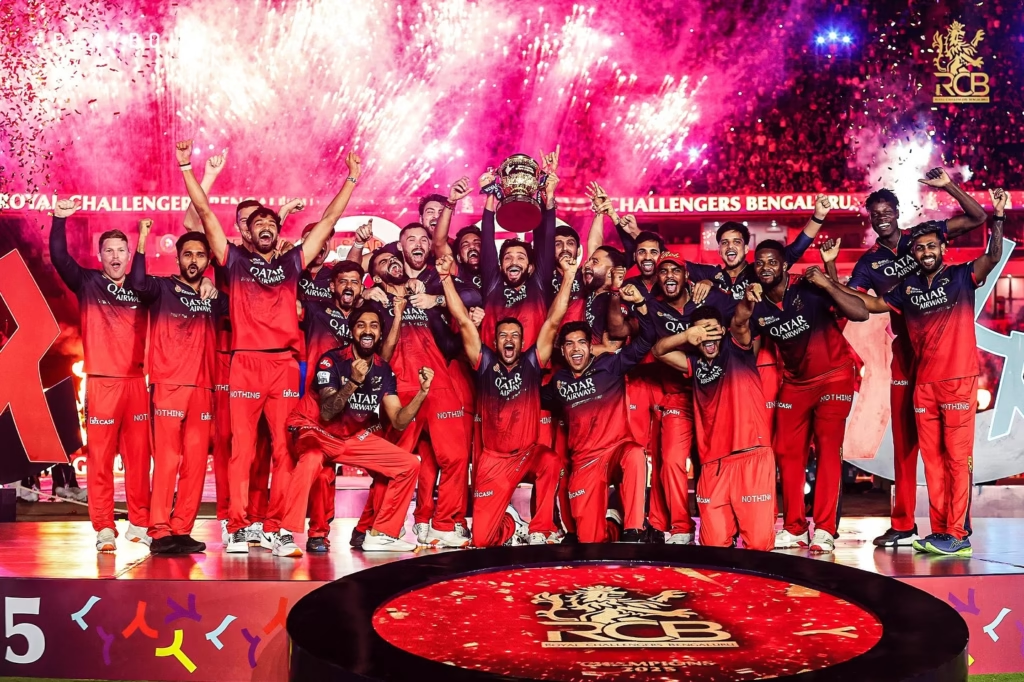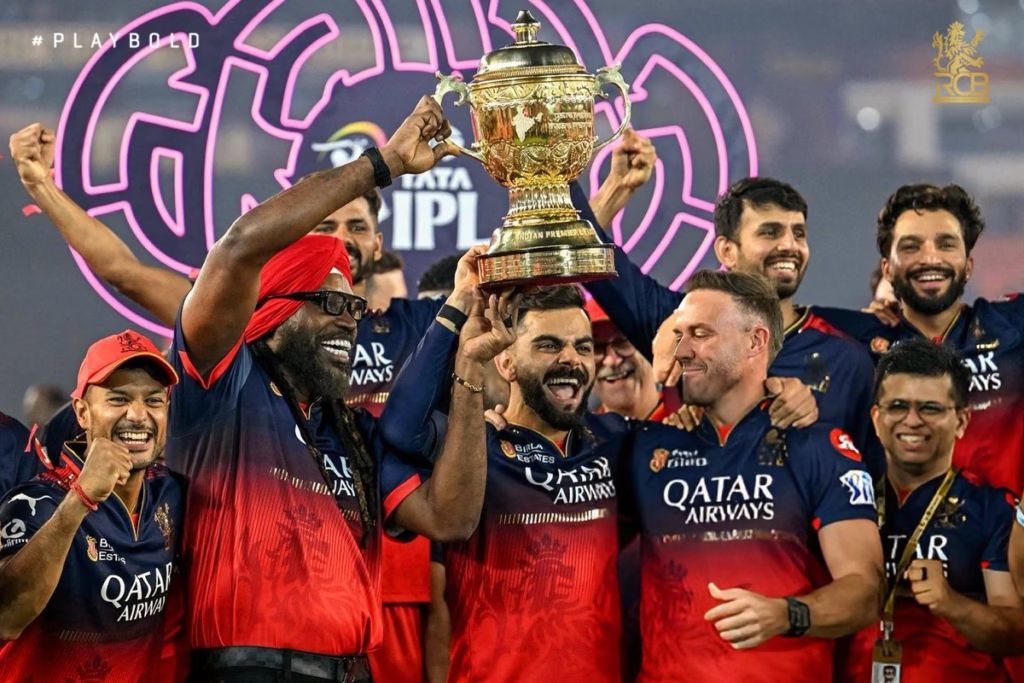Vijay Diwas: Commemorating India’s Triumph in the 1971 War
Highlights
- India-Pakistan war took place in 1971.
- About 90 thousand Pakistani soldiers had surrendered to India.
- This marked the end of the conflict and the birth of Bangladesh as an independent nation.
Vijay Diwas is an annual celebration observed on December 16, commemorating the triumph of the Indian armed forces in the 1971 India-Pakistan war.
Today, on December 16, 2023, the nation is celebrating the 52nd anniversary of Vijay Diwas.
This significant event marks the day when the Pakistani military in East Pakistan (now Bangladesh) surrendered to the joint forces of the Indian Army and the Mukti Bahini, leading to the creation of Bangladesh.
Vijay Diwas is a day to honor and pay tribute to the soldiers who sacrificed their lives for the nation during the conflict.
Origins and Prelude to War:
The roots of the conflict lie in the political unrest and ethnic tensions in East Pakistan. Pakistan’s pre-emptive airstrikes on 11 Indian Air Force stations on December 3, 1971, marked the formal initiation of hostilities.
Operation Searchlight:
Following the initiation of Operation Searchlight during the 1971 Bangladesh Liberation War, the primary targets extended beyond Dhaka University teachers and students.
- The widespread military crackdown, authorized by Pakistan’s President Yahya Khan, targeted Bengali nationalists, intellectuals, and civilians who were advocating for the independence of Bangladesh.
- The operation involved mass arrests, torture, and killings, leading to a humanitarian crisis and contributing to the overall context of the war.
The tragic events during Operation Searchlight contributed significantly to the unfolding of the 1971 war and, eventually, the creation of the independent nation of Bangladesh.
Indian Response and Support for Bengali Nationalists:
Faced with the unfolding tragedy, India decided to intervene, offering support to Bengali nationalist groups fighting for independence in East Pakistan.
- The Indian Army’s engagement in the conflict was driven not only by strategic considerations but also by a commitment to humanitarian justice and the principles of self-determination.
Highlights and Important Facts of Indo – Pak War 1971
The war lasted for 13 days:
The Indo-Pakistan War of 1971, initiated on December 3, spanned a duration of 13 days and formally concluded on December 16, when Pakistan officially surrendered to India.
Operation Trident
On December 4, 1971, India initiated Operation Trident, a strategically significant move executed by the Indian Navy’s Western Naval Command.
- Under the codename Trident, this operation involved a surprise attack on the Karachi port.
- The Indian Navy successfully carried out this mission, inflicting substantial damage on Pakistani naval assets and facilities in a bold and well-coordinated maneuver.
Operation Trident marked a crucial development in the Indo-Pakistan war of 1971 and showcased India’s naval prowess and tactical capabilities.
Surrender in Dhaka:
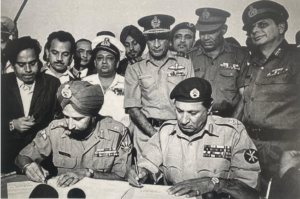
Lieutenant General Amir Abdullah Khan (AAK) Niazi, the Commander of the Pakistan Eastern Command, signed the Instrument of Surrender on December 16, 1971, in the presence of Lieutenant General JS Aurora.
- This historic event took place in Dhaka, marking the formal and symbolic conclusion of the Indo-Pakistan war of 1971.
- The signing of the Instrument of Surrender signaled the acceptance of defeat by the Pakistani military in East Pakistan (now Bangladesh) and the victory of the joint forces of the Indian Army and the Mukti Bahini.
- The ceremony was a momentous occasion that led to the creation of Bangladesh as an independent nation.
The Role of Indira Gandhi:
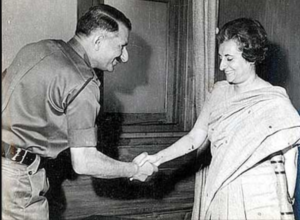
As the Prime Minister of India during the 1971 war, Indira Gandhi provided strong leadership and support for the cause of Bengali independence.
- Her diplomatic efforts and strategic decision-making contributed to the success of the military campaign.
The Role of General Sam Manekshaw:
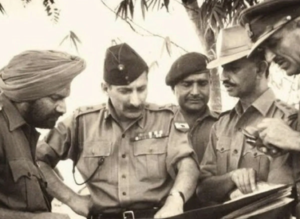
Known as “Sam Bahadur,” General Sam Manekshaw was the Chief of the Indian Army during the 1971 war.
- His strategic acumen and leadership were instrumental in planning and executing successful military operations, ultimately leading to the victory and the creation of Bangladesh.
The Role of Major General JFR Jacob:
At the time of the 1971 Indo-Pakistan war, Major General Jacob held the position of Chief of Staff in the Indian Army’s Eastern Command. He played an important role in this war.
- Field Marshal Sam Manekshaw, the Chief of the Indian Army at the time, specifically assigned him the crucial responsibility of overseeing the surrender process, highlighting the trust and confidence placed in Major General JFR Jacob’s abilities and leadership during this historic moment.
AAK Niazi was given a 30-minute ultimatum to surrender
Major General Jacob informed AAK Niazi that if he did not agree to surrender within 30 minutes, another round of fighting and bombing would be ordered.
- After leaving the room, Jacob returned after the stipulated time to find the surrender document on the table.
- When he asked Niazi if he accepted it, there was no immediate response. Jacob repeated the question three times, receiving no answer.
- Eventually, he picked up the surrender paper, stating his belief that Niazi had accepted the terms.
Interestingly, when the Pakistani Army surrendered, it had 26,400 soldiers in Dhaka whereas India had only 30,000 soldiers 30 kilometers away from Dhaka, but it was Jacob’s wisdom that he convinced Niazi to surrender.
About “Mukti Bahini”
“Mukti Bahini” refers to the armed organizations that actively fought against the Pakistan Army during the Bangladesh Liberation War.
- Emerging as a guerrilla resistance movement, the Mukti Bahini played a crucial role in the struggle for the liberation of Bangladesh.
Bangladesh celebrates Independence Day on Dec 16
- Bangladesh, a nation that came into existence on this historic day, celebrates its Independence Day, known as “Bijoy Dibos,” every year on December 16.
Historical milestone for India
The Indo-Pakistan war of 1971 is a historical milestone for India, and December 16 is celebrated as ‘Vijay Diwas’ across the country to commemorate the victory over Pakistan.
In this significant conflict, approximately 3,900 Indian soldiers sacrificed their lives, and about 9,851 were injured.
The day serves as a tribute to the bravery and valor of those who fought in the war, highlighting the sacrifices made by the armed forces in securing the nation’s triumph.
Vijay Diwas stands as a symbol of India’s resilience and commitment to defending its principles and borders.
Thanks
Happy reading!!









